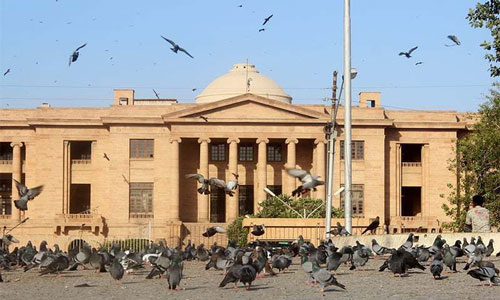The Sindh High Court (SHC) recently set aside the life imprisonment of a man in a case pertaining to the murder of his wife.Ansar Khan was sentenced to life imprisonment for strangulating his wife Afshan to death and his mother Anwari Begum and sister Maira were sentenced to six months for attempting to cause disappearance of evidence in order to save themselves from legal consequences by an additional district and sessions court East.
The trial court also acquitted two co-accused, Saba and Hira, after giving them the benefit of the doubt. A counsel for the appellants submitted that they were innocent and had been falsely involved in the case by the complainant party in order to satisfy their grudge against them due to a matrimonial dispute.The counsel submitted that it was a case of suicide that had been given the cover of murder, even otherwise the incident was not witnessed by anyone, due to which the appellants were entitled to acquittal due to the benefit of the doubt.An additional prosecutor general supported the impugned judgment and sought dismissal of the instant appeal by contending that the prosecution had been able to prove its case against the appellants beyond any shadow of doubt.
A single bench of the SHC comprising Justice Irshad Ali Shah, after hearing the arguments, observed that the complainant, Mohammad Saleem, had stated that the deceased was his daughter and was married with the appellant.
The high court observed that the complainant had deposed that his wife Shahnaz intimated him that she had noticed mark of violence on the neck of the deceased but Shahnaz had not been examined by the prosecution for no obvious reason and her non-examination could not be overlooked.
The high court observed that a medico-legal officer with whom the complainant initially met and obtained the body of the deceased without a post-mortem had not been examined by the prosecution too.The bench observed that the investigation officer had admitted that he submitted the charge sheet of the case six months after the registration of an FIR and no explanation was offered by him for that, which reflected adversely on his performance.The SHC observed that no confessional statement of the appellant was recorded before the magistrate concerned and such omission could not be lost sight of. The high court observed that in the presence of such untrustworthy evidence, it could be concluded safely that the prosecution had not been able to prove its case against the appellants beyond any shadow of doubt.The bench observed that none of the prosecution witnesses had actually seen the appellants committing the murder. The SHC set aside the life imprisonment of Khan and six-month sentence to the other co-accused, and ordered their release if not required in other cases.










